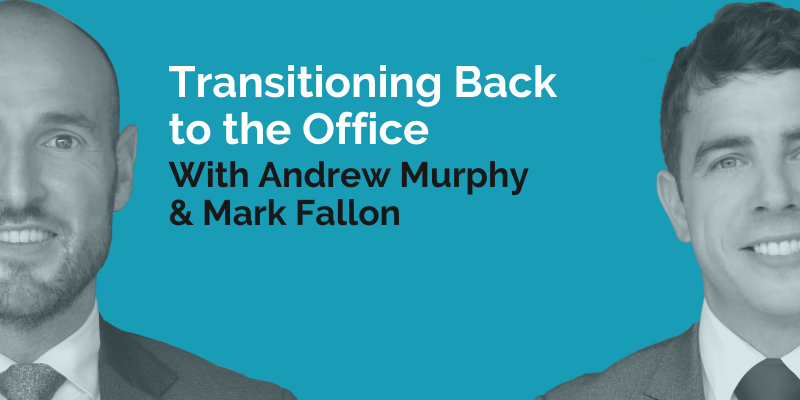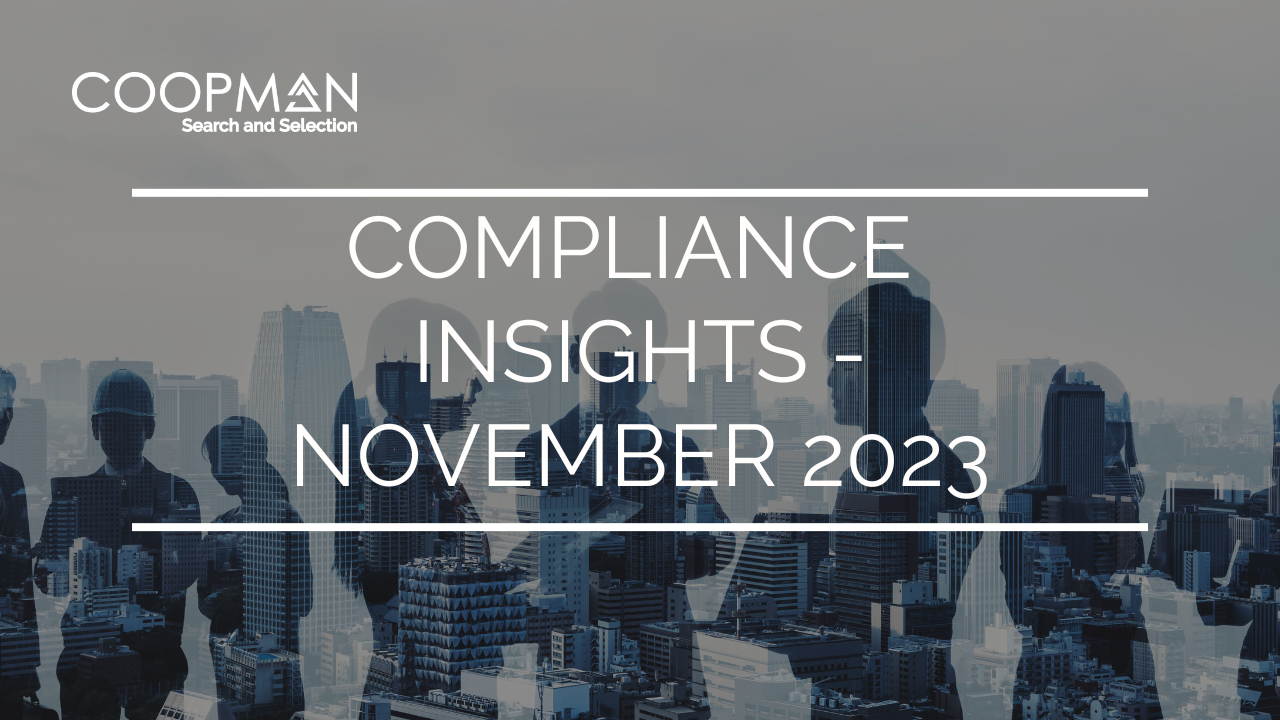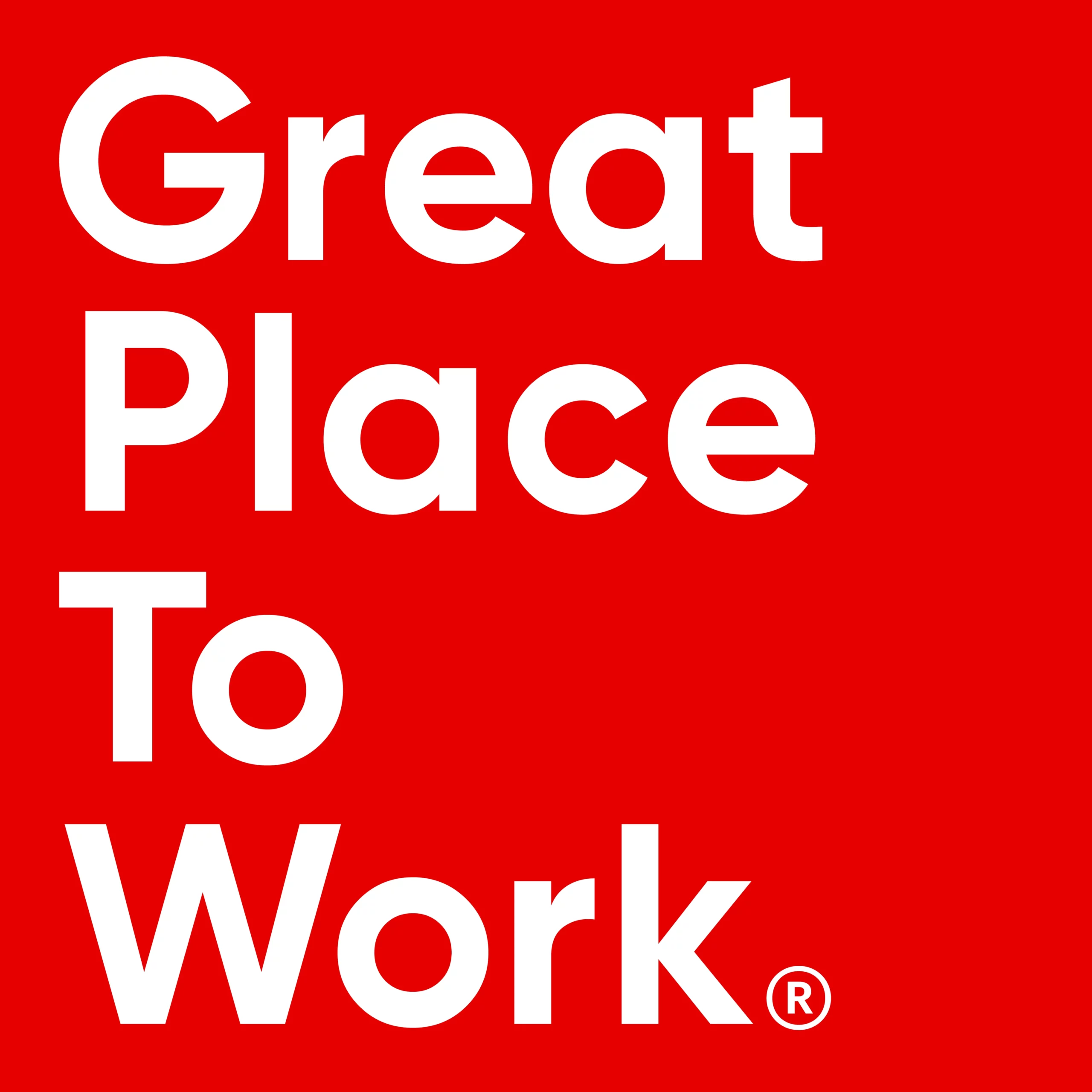In our tenth episode of Conversations With Coopman, our final episode in series 1, co-hosts Andrew Murphy and Mark Fallon discuss the results of a survey conducted by Coopman Search and Selection on attracting and retaining talent in a post-pandemic working world.
Over 90 employers in financial services across Ireland and the UK took part in the survey in which 96% stated that they believe offering opportunities like remote or hybrid working will act as a competitive advantage when it comes to talent attraction and retention post Covid-19. While 9 in 10 employers plan to make increased flexible working arrangements available to employees on returning to the office, 64% fear this may result in a loss of culture and office energy.
Employers were also asked about their expectations for returning to the office. Of those that are planning to return, 67% feel confident that it will happen this year, 54% expect to adjust their office space, and nearly a third are planning to downsize, or offer employees access to digital or remote working hubs. 89% will offer hybrid working post pandemic, up from 26% prior to the pandemic, with the majority favouring a 2-3 or 3-2 hybrid model. Interestingly, there is very little appetite amongst employers in financial services to implement a form of structured flexibility in which there are dedicated office-based days for all employees to be in the office.
In this episode, Andrew and Mark provide their thoughts, opinions and predictions for the return to the office and implementation of flexible working arrangements by companies located in Ireland and the UK, as well as briefly reflecting on the excellent speakers and interesting topics covered in series 1 of the podcast.
Key takeaways from this conversation include:
A LOOK BACK AT SERIES 1
The goal of the podcast was to cover macro conditions in the market and provide valuable insights from leading professionals and industry experts in both Ireland and the UK. It was certainly a very interesting and exciting series with many excellent speakers sharing advice, tips and different perspectives for individuals across a range of topics in the financial services industry.
The series launched with The Sustainable Revolution, in which Andrew and Mark were joined by sustainable finance professional, Per Stahl. Per covered the demand for sustainable finance, the opportunities available in sustainability both abroad and in Ireland, and what needs to be done at a corporate level to make further progress in the area.
In episode 2, Risk and Regulation, Kevin McHugh of Priory GRC discussed the main challenges facing Central Bank of Ireland (CBI) regulated firms from a risk and regulatory perspective, the importance of a risk culture and what it means for businesses, and he also delved into the fitness and probity process with the CBI and what candidates should take into consideration.
Fiona De Lacy, Walkers Professional Services on episode 3, Challenging Ourselves to do Business Differently, shared her thoughts on leadership and doing business during Covid-19 and provided insights into what leaders need to do to challenge themselves to do business differently in the future.
In the fourth podcast episode, Building a Successful Fintech, Hesus Inoma of Grant Thornton, discussed the business models and approaches of successful fintechs, and broke down companies like Revolut and Lemonade, as well as providing a glimpse into the IFSC of the future.
On Taking a Holistic Approach to D&I, episode 5 with Siobhan Sweeney, the discussion focused on the need for further awareness and education to drive the diversity and inclusion (D&I) agenda, how AIB successfully implemented a holistic D&I strategy, how financial services companies are doing in the D&I space and the impact of the Open Doors Initiative.
Stan Barnes, Aergo Capital on episode 6, Aircraft Leasing in a Black Swan Event, discussed 2020 from the company’s perspective and current market conditions, along with opportunities and challenges facing aircraft leasing companies, and he also shared his predictions for Aergo and the wider industry in 2021.
On episode 7, The Intersection & Regulation of Data in FinTech, Charmian Simmons covered how the pandemic impacted the fintech sector, how it is positioned from a controls and regulatory stand point, and what the landscape looks like for fintechs in the years ahead.
Mike Rogers of Investment Governance Services on the eighth episode, Preparing for TCFD, discussed the Task Force on Climate-related Financial Disclosures (TCFD) and why it is coming into effect, what pension funds and asset managers need to do to plan ahead, and the importance of attracting the right resources to ensure pension funds can meet the enormous challenge and opportunity of climate change.
And finally, episode 9, Bolstering Diversity in Asset Management with Mariam Akanbi, Black Woman in Asset Management (BWAM) who provided excellent advice for the investment community in creating a more diverse and inclusive workforce, and discussed the great work that they are doing at BWAM and the exciting plans they have for the future.
FLEXIBILITY IN A POST-PANDEMIC WORKING WORLD
The objective of the survey was to find out and gather information about what companies were doing in financial services in terms of flexibility on returning to the office.
The feedback on the survey is that the majority of companies will implement some form of flexibility, with 2-3 and 3-2 hybrid models proving the most popular and a handful of companies offering 2-2-1 (2 days in the office, 2 at home and 1 flexi day in which it is at the employee’s discretion where they want to spend their last working weekday).
The biggest fear facing employers with the return to the office is a loss of company culture, office energy and collaboration. Employees miss socialising and in particular, junior members of the workforce perhaps entering the market for the first time are not receiving the managerial oversight they need as well as not experiencing the social aspect of a company’s culture.
The media has impacted the perspectives of people and in some ways distorted the idea of flexibility post Covid-19, as most people that Coopman Search and Selection speak to want to return to the office. This is specifically within financial services and while they still want some flexibility in their schedules, fully remote or mostly remote working opportunities are not a desirable option for the majority of people. Individuals want a balance between flexibility and being in the office.
Companies need to ask themselves what flexibility looks like in their businesses. It is not necessarily a hybrid or remote working model, but the hours people are working will never be 9-5 again. Companies should consider implementing core working hours but allow people the flexibility to work hours that suit their personal circumstances or commitments. Some companies are already doing this but it is important to create a culture that supports it, for example task-orientated management as opposed to clock watching.
IRELAND V UK COMPANIES’ APPROACH TO FLEXIBILITY
Everyone’s situation is different and the overall perception in the UK is that people have enjoyed the slowdown of life but in comparison to the Ireland market, there is not an overarching need for a policy and concrete rules around flexibility. People might be more relaxed around flexibility, and in particular companies like Goldman and Morgan Stanley have come out already to say they want people back in the office. As well as this, a huge amount of money is still going into office development in major cities so it is the expectation that the return to the office is soon approaching.
Coopman Search and Selection’s focus in the UK market is very much on the asset management sector, particularly boutique firms in size. Such employers will support flexibility if it is needed but they want people to be together and collaborate. The majority are not looking for their employees to be back 5 days in the office but certainly a proportion of the week.
While clients in the UK will likely want employees to come back to office and may provide some flexibility, they likely won’t offer very structured working models (2-3, 3-2, 2-2-1) like Ireland. The Irish market also has the right to ask for remote working which favours a more structured flexibility workforce.
THE POSSIBILITY OF LOSING TALENT IN THE ABSENCE OF FLEXIBILITY
It is certainly a possibility that companies may lose talent if they do not define their approach to flexibility or if they do not offer flexibility for their employees. Employers need to keep in mind that if they implement a policy, it is not going to fulfil everyone’s requirements and people may leave to go to a competitor with a different flexibility offering.
Employees who are not happy and go to market to explore different options, may find that in fact other companies or competitors are offering similar policies and approaches to flexibility – the grass is not always greener in every case.
Overall, every company will likely implement some form of flexibility so competition to attract and retain talent using flexible working options as a unique selling point may not actually have great impact, however companies that do not plan to offer any form of flexibility may find it difficult to compete for the short term.
HOW COMPANIES CAN KEEP THEIR TALENT ON RETURNING TO THE OFFICE
HR professionals certainly have a challenge ahead of them in terms of talent retention and attraction in the coming months. Companies don’t want to lose their best talent, they want to have high retention rates and continue to hire for team and business growth.
To support flexibility, companies will need to look at their polices, technology, culture and inclusiveness, benefits, success measurement, task-orientated output and so much more to enable hybrid models.
For small to medium size companies, it may be possible for employers to carry out risk assessments for every individual employee, to understand what they are looking for when it comes to flexibility and what their motivations are for the return to the office. For larger companies however, this will not be possible and it will have to be an approach of what is the general consensus amongst employees when it comes to flexibility.
It is difficult to say what companies should do exactly as flexibility will be unique for every business. It is important that companies do what is best for their employees, if they take that approach, their employees will respond. The flexibility offering of companies will need to be constantly refined in a post-pandemic world.
It will be interesting to watch the UK and see what they are doing across the financial services market, to learn from the success and the challenges and to either implement the same or do things differently in the Irish market.
PREDICTED TRENDS WITH THE TRANSITION BACK TO THE OFFICE
The move back to the office will be a huge change and it will be hard for people. We are creatures of habit and after 14 months of working from home, we are used to it. People need time to adapt and to climatise to the change of working life and employers need to allow time for it.
During the transition period, people will question what they want from their career, for example whether the job is right for them, whether they are happy with the company, even whether they are happy with their commute to work. These questions will be both asked and answered on the return to the office and it will result in some employees deciding to look for new opportunities.
Likewise, businesses have to find models that work for their companies, based on their size, their sector and many other factors. Employers will take different approaches and their will likely be a bit of division in the market in terms of the approach to flexibility. This will also cause a shift of talent, where employees will gravitate towards companies that work in terms of the flexibility they need or want, whether that be office-based, remote working or a combination of the two.
Any movement in the market will however settle and companies will find a new way to operate. Perhaps eventually, we will return to a largely office-based working force again but only time will tell.
CONCLUSION
The return to the office will be a period of change for both employees and employers, during which a shift in talent is inevitable. After more than a year of working from home, professionals value the flexibility they have come accustomed to, and companies that do not offer some form of flexibility post Covid-19 may lose talent to their competitors. Despite this, every company is different and will have to find the right model that works for their business and their employees.
For more factual information for employers in financial services who want to define their flexibility polices, download our report “Attracting and Retaining Talent in a Post-Pandemic Working World: A Guide for Employers” below. Alternatively, you can reach out to us directly at connect@coopman.ie to find out more about what is happening in the financial services market.
Listen to “Transitioning Back to the Office With Andrew Murphy & Mark Fallon” on Spotify, Apple or Anchor now, or sign-up to receive the latest podcast episodes straight to your inbox.
DOWNLOAD THE GUIDE








